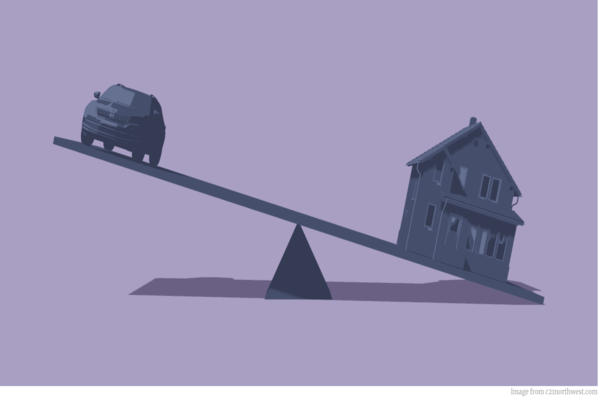
Financial Happiness – Does Money Make You Happier?
September 14, 2021
What are The Many Benefits of E-Wallets in Malaysia?
September 14, 2021Many of you will know the difference between assets and liabilities, but allow me to explain for those that don’t. An asset is something that potentially goes up in value over time, such as a limited edition timepiece, property, or blue chip shares. Liabilities are what’s owed to other parties such as banks or even friends and family, which can include your house or car loan, or study loans. The difference between your assets and liabilities is what’s known as your net worth.
But why does this matter? Consider this – if you stop working today, how long can you survive financially? Many people have lost their jobs or faced pay cuts during the Covid-19 pandemic, and the hardest hit are usually entry-level employees who have just started their careers. Most, if not all, would have accumulated some assets if they consistently saved and invested from their first paycheck, while others may have car loans or credit card loans to settle.
Some may have filial responsibilities and need to support their family and loved ones with their entry-level pay. According to a Jobstreet salary report, the minimum income level for fresh graduates before the pandemic was between RM1,949 to RM2,836, which is very low considering the time-cost requirements to get an education. No matter the situation, you must repay your commitments, and if you’re unable to, the worst case scenario is being declared bankrupt and forfeiting your assets to the bank! It’s crucial for fresh graduates to have basic financial knowledge, and take proper action to safeguard their own finances.
Good Assets vs Bad Assets
Although your net worth is your true wealth, this isn’t the be-all and end-all. There are many other financial areas we must look at; assets and liabilities are only one part of the equation. Generally, there are good and bad assets but of course, whether or not it’s a good asset depends on the owner’s perception, so there are no hard and fast rules to judge whether an asset is good or bad.
For instance, an investment property that has been successfully rented out for the past 10 years might be deemed as a good asset, but when it loses its ability to be rented, then it suddenly becomes a bad asset. Impatient or desperate owners may try to sell the property before finding out the underlying reason for the failure to secure a new tenant.
Another common example is a car, which many perceive as a liability. However, this has changed since technology revolutionised the taxi industry, with the emergence and eventual merger of the Uber and Grab ride-sharing platforms. For many gig workers, the traditional perception of a car being a liability changed as it became a tool to generate active income instead of solely required for travelling to work. As you can see, what can be considered a good or bad asset is somewhat subjective, but all it takes is a little assessment to judge for yourself.
Understanding Various Forms of Debts
Apart from assets, you also need to review your debt. In the market, there are numerous forms of debt, such as personal debt, corporate debt, or even government debt, and so on. Let’s focus on some of the debt that fresh graduates are more likely to carry, which may include student loans, credit card debts, hire purchase (car loans), and mortgages (housing loan).
These four types of loan are common among fresh graduates, and are typically the type of debts that people start acquiring in their 20s. Of course, the ideal scenario is not getting into these but it’s more likely than not! As these loans come at different costs to the consumer, you must fully understand the respective terms and conditions before taking on these debts.
Managing Money by Understanding Assets and Liabilities
Once you’re mindful of what assets and liabilities are available, you can start learning how to maximise opportunities. For example, if you love shopping, get a credit card with cash-back or rewards points and use them when purchasing daily necessities. Needless to say, you should be conscious of your budget and settle the bill in full before the due date! In the long run, not only does timely credit card repayments build your credit score, but more importantly, it becomes ingrained as part of your money habits!
How to grow your net worth?
Now that you know the difference between assets and liabilities, you should start planning how to grow your net worth? As a fresh graduate, the road is likely to be long but not unattainable so do try some of these tips to speed up the journey:
Reduce your debt
Since debt is the major factor dragging down your net worth, it’s advisable to keep this to a minimum. As a benchmark, your total debt should be around 50% out of your total assets. If you’re at a higher debt level, consider allocating more of your income to reducing it.
Expenses
This may seem obvious but your daily expenses can pile up, especially if you don’t differentiate between needs and wants. Spend on what you truly need rather than what you want. If you buy too much of what you want, you may not have enough to buy what you need.
Savings
Once you have successfully lowered down your expenses, you’ll definitely see your savings increase. If you are working in the Klang Valley, a good benchmark to aim for is a saving rate of 30% from your gross income. Anything more than this is amazing!
Investing
Once you have built up your savings for a rainy day, start looking at investing elsewhere since keeping your money in bank deposits will hardly beat inflation. In the long run, you’ll potentially see your assets grow steadily if you do it right, and increase your net worth as a result.
In short, clear your debts, spend wisely and invest sensibly. Bear in mind though, it’s easier said than done!
First published in Smart Investor 1, 2021 Issue

Wong Chee Yang
Licensed Financial Planner with Finwealth Management Sdn Bhd




